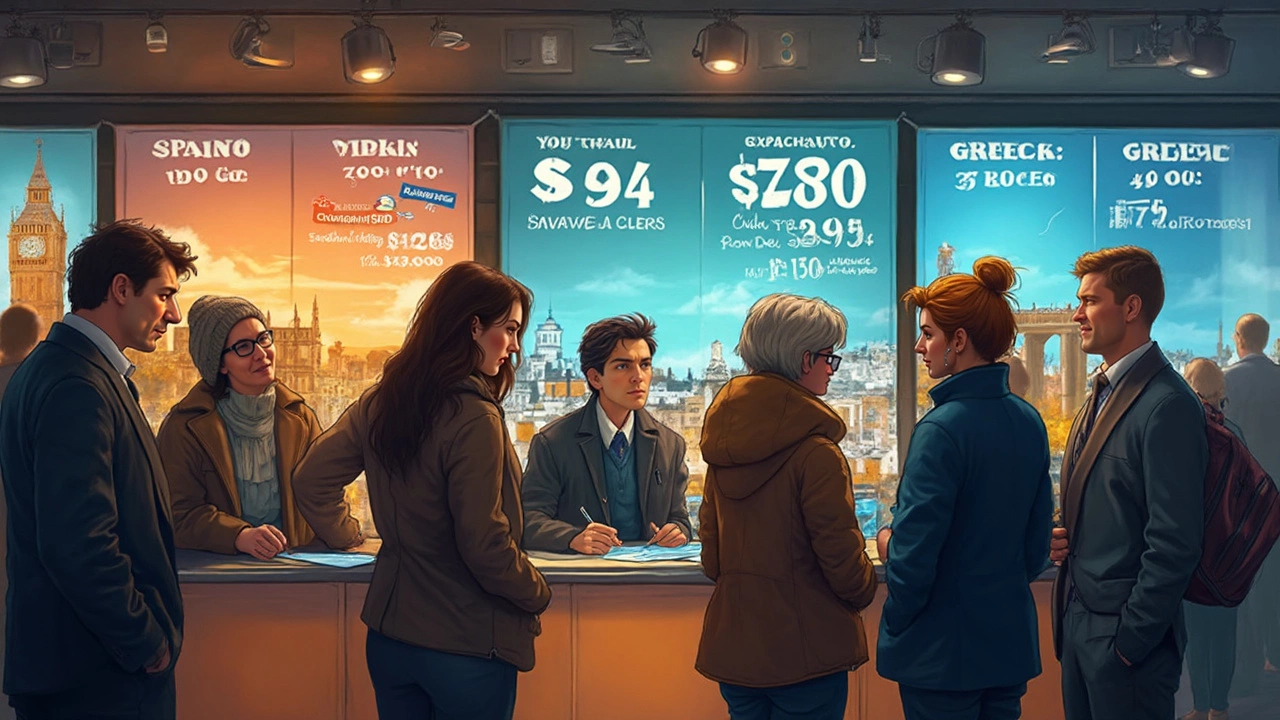Is it Cheaper to Book a Trip as a Package? Holiday Deals Unpacked
 May, 14 2025
May, 14 2025
Scroll any travel website, and flashy deals for 'save big with our package' pop out at you. But is clicking that bundle always the best idea for your wallet? It really depends on a mix of timing, destination, and the actual extras tucked into that price.
For some destinations and dates, packages drop the overall cost—think of high-demand places and peak season when bundling means bulk rates for the provider and cheaper deals for you. But sometimes those packages toss in meals or tours you never wanted, or the hotel sits miles from where you actually want to be.
The best savings usually show up when you’re flexible and comparison shop. Look at both the package price and what you’d pay for flights, hotel, and transfers by booking separately. Don’t forget to account for ‘extras’ that sneak into solo booking, like airport transfer fees or resort taxes that are sometimes lumped in with a package but surprise you when paid separately.
- What Counts as a Package Deal?
- When Bundling Saves You the Most
- Hidden Costs and Surprises
- Tips to Unlock the Best Value
- Real Comparisons: Package vs DIY
What Counts as a Package Deal?
So, what exactly makes a booking a “package deal” and not just a regular trip? In simple terms, a travel package puts at least two holiday elements—like a flight and hotel—together under one price. Most big online sites and high street travel agents call it a package holiday if you book things like flights, hotels, transfers, or sometimes even meals and activities, all on the same ticket. You pay one price, even if a bunch of things are bundled inside.
The catch is, not every deal you see as a "bundle" online counts as a true legal package. For example, if you just book a flight and then add a car rental later in another transaction, that’s not always covered by the same package rules for refunds and protection. In the UK and EU, anything sold as a package automatically gives you extra rights—for example, if the airline goes bust, your accommodation is still protected. In the US, these protections work a bit differently and often depend on the provider—so always check the small print.
Here’s what’s usually included in a proper package deal:
- Flight + hotel (most common)
- Flight + hotel + transfer (like an airport shuttle or coach)
- Flight + car hire
- Hotel + activities (like tours, theme parks, local excursions)
- All-inclusive holidays, where almost everything is bundled in
If you grab packages from big names like Expedia, TUI, Jet2holidays, or Booking.com, you’re looking at deals where the major parts—such as flights and hotels—are paid for together in one transaction.
Here’s a quick look at how the main package types stack up:
| Type | What's Included | Extra Protections? |
|---|---|---|
| Basic Package | Flight + hotel | Usually, yes |
| All-Inclusive | Flight + hotel + meals + drinks + activities | Yes, plus extra extras |
| Dynamic Package | Flight + hotel + optional add-ons picked online | Sometimes – read provider's terms |
| Build-Your-Own | Mix and match flight, hotel, activities (in a single payment) | If booked together, yes |
Bottom line: a good travel package isn’t just about convenience. When you buy multiple elements at once, you often get bundled protection and better chances of sorting stuff out if your plans go sideways.
When Bundling Saves You the Most
If you’ve ever debated between a package deal and building the trip yourself, here’s the bottom line: packages can deliver the best value in certain situations, especially for popular vacation spots or peak periods. Think about spring breaks, winter holidays, or big events—airlines and hotels often jack up prices for solo bookings during these times, but package sites might have reserved spots months before, letting you snag a lower fixed rate.
The biggest savings tend to hit when you’re booking flights and hotels together. Flight-and-hotel combos are the core of any package holidays deal. Expedia has shown in their annual traveler reports that bundling these can save travelers up to 15-20% compared to booking each separately. These discounts are baked in because providers get deals for selling rooms and seats in bulk, passing some savings to you if you’re willing to go with their options.
Families or groups usually see better value in a package, since the logistics are bundled and prices are often based on groups. Resorts in places like Cancun or Tenerife commonly offer all-inclusive deals that light up your savings even more, especially compared to booking food, activities, and transfers one by one.
- If you’re looking at big-name beach destinations or city breaks, check packages during major school or public holidays—these are hotspots for bundled bargains.
- Last-minute trips can actually be cheaper with packages, especially if airlines or hotels need to fill empty spots and cut prices at the 11th hour.
- First-time travelers or anyone who doesn’t want the stress of comparing endless options can save time and potentially money, since all the main logistics are wrapped up in one simple buy.
On the other hand, if you want highly specific experiences or have tons of flexibility, DIY might open up unique deals. But for most classic holidays, especially to big tourist belts, packages have an edge when you want an easy win for your budget.

Hidden Costs and Surprises
Package holidays promise simplicity, but sometimes the fine print can make or break your budget. That "all-in-one deal" doesn't always mean everything is truly included. For example, some packages skip over local resort taxes—these have to be paid at the hotel, and in places like Spain or Greece, they can run up to €4 ($4.50) per person, per night. If you're booking for a week, that small fee multiplies quickly.
Airport transfers? Sometimes yes, sometimes nope. Some travel companies bundle shuttles from the airport to your hotel, but others just don’t. You could land in a foreign country and find out it's another $40 for a taxi or $25 for a shared bus that wasn’t part of the upfront price. Always double-check this when comparing options.
Here's another surprise: luggage. Some low-cost airlines work with tour operators, and might include only a checked bag or even just a small carry-on. If you’re expecting to bring more (beach trip, anyone?), those extra bags could cost $30 to $75 per leg. Not tiny. Read the details of your booking confirmation to avoid that "surprise" at the airport.
- Check if meals are all-inclusive or just breakfast—what you eat on vacation is a big part of your budget.
- Watch out for "optional excursions" or guided tours listed in a package. Sometimes they’re shown in photos or descriptions but cost extra when you get there.
- Double-check entry fees for main attractions. With some packages, tickets for museums or parks aren't part of the deal, and you’ll have to pay those out of pocket.
The most important thing? Always compare the full breakdown of a package deal side-by-side with DIY planning. The real test isn’t just the upfront price, but knowing exactly what’s included and what isn’t. This is a make-or-break step for scoring the real package holidays savings.
Tips to Unlock the Best Value
If you want to squeeze every penny out of your next holiday budget, it pays to play smart. Package deals can save you cash, but only if you know how to dig for the best ones—and avoid sneaky traps.
- Compare Total Costs: Before hitting that “book now” button, open two tabs—one for package holidays and one for booking flights and hotels separately. Toss in extras like luggage, airport transfers, and resort fees. This way, you see exactly who's offering the better bottom line.
- Time Your Booking: According to Expedia’s 2024 report, travelers booking package holidays at least 21 days in advance paid about 30% less than those booking last minute. Summer and Christmas getaways are when bundles usually shine.
- Look for Guaranteed Flexibility: Sometimes, a slightly pricier package comes with better cancellation or rebooking policies. This saved my cousin a load of stress when a sudden work thing popped up right before her Spain trip.
- Sign Up for Alerts: Airlines and big travel sites run flash deals or discounts just for email subscribers. If you’re planning ahead, these can knock an extra 10-15% off. Don’t forget to check loyalty programs too—more points mean more perks.
- Check What's Really Included: Not all packages are born equal. Some throw in free breakfasts, others just basic rooms. I once found a "cheap package" that didn’t include transfers, meaning a pricey taxi ride ate away all the supposed savings. Always read the fine print.
Here's a quick stat rundown so you can see how package vs. DIY prices stack up in real life:
| Destination | Package Price (per person, 7 nights) | DIY Price (separate flight + hotel) | Extras Included |
|---|---|---|---|
| Crete | $1,050 | $1,210 | Breakfast, transfers |
| Paris | $1,400 | $1,280 | None |
| Orlando | $1,900 | $2,080 | Theme park tickets |
Bargains really depend on where you're heading and what you need. Packages are usually golden for resort spots or long-haul trips, since big companies can grab sweet group rates. But if you just want a city break and don't care about extras, DIY can come out cheaper. Always, always, do the math before you commit.

Real Comparisons: Package vs DIY
Let’s break it down with some actual numbers. Say you want to go from Manchester to Tenerife in mid-June for a week. A leading travel site shows a package holiday at a 4-star beach resort, including direct flights, hotel, airport transfers, and checked luggage, for £740 per person.
Now, booking everything separately: that same direct return flight costs about £310, the exact hotel is £370 for the week, airport transfers run £50, and checked luggage is £40. No fancy extras. That totals £770—more expensive than the package, and you still have to juggle all those bookings yourself.
But sometimes, DIY wins out. For a city break to Rome, individual flight and hotel bookings can give more flexibility and often beat package prices, since airlines and boutique hotels offer flash sales. For example, a weekend flight and central B&B in July might cost only £230 altogether, while the cheapest package hovers around £280, often with less central or lower-rated hotels.
Here’s how to spot the winner:
- Check the price: Add up flight, hotel, and extras and compare it to the package total.
- Location matters: Packages might stick you farther out; check the hotel’s actual address.
- Look for hidden fees: Resort fees and transfer costs often sneak into separate bookings, but some packages absorb them.
- Flexibility: DIY lets you choose your airline, room type, and add extras you actually want.
- Strength in numbers: For family travel, packages can offer huge perks, like free child places or group discounts.
Bottom line: neither option always wins. If getting the package holidays price lower than your DIY sum—especially once you count time, transfers, and peace of mind—you’ve snagged a good deal. But for more control or last-minute steals, piecing it together yourself could be smarter.
